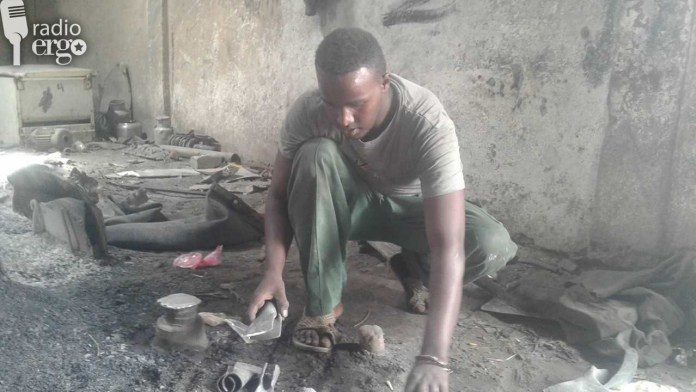Deeq Mohamed Ali, a metal worker in Hargeisa, has been frustrated by the lack of business in the last few months, as the drought caused the pastoralist families his trade depends on to migrate away to other areas in search of food and water.
Deeq, who leads the local blacksmiths association, estimates that 950 men involved in metal working have been made unemployed in the past six months in this part of Somaliland.
At Birmaal Workshop, Deeq’s own business, they produce spades and other tools, water storage tanks, instruments for livestock slaughtering, construction equipment and fencing for livestock.
“My livelihood depended on the rural families, so when they migrated away we couldn’t find people to purchase our products,” said Deeq
Deeq told Radio Ergo that some members of the trade association are now spending most of their time at home. They cannot provide for their families or pay school fees for their children.
Abdi Mire Aadan, a father of seven, stopped working five months ago when business dried up. The family was evicted from their three room house last December for failing to pay the $90 rent. They now sleep in a makeshift hut Abdi erected on an open plot of land, owned by a relative, alongside other destitute families.
Abdi, who has been in the trade for the last 20 years, used to make between $30 and $50 a day. Now, he has to beg to get food for his family. In the six months he has not been able to pay school fees for his four children at their Koranic school.
“I used to be well off before. The people that supported our business have been struggling, so what do you think we can do? We can’t do much, only God can help us,” said Abdi.
Others are earning reduced income from the sale of cheap items like charcoal stoves. The stoves, hammered out from old tins, sell for just $1 each.
Muhydin Hersi, a metal worker, told Radio Ergo he made 10 axes last month but finds they are hard to sell. He is struggling to support his wife and three children on around $3 a day if he is lucky, down from the $10 or so he used to earn.
“The drought has not only affected the local pastoralists. We are just like the families that lost their livestock – just as they are struggling we can also understand their situation,” he said. He hopes life will improve after the drought, when the livestock trade resumes.
![]()




























